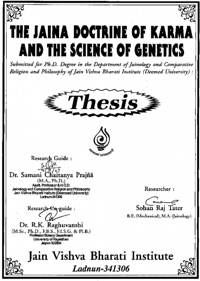Ten States (Processes) Of Karma
One of the most fundamental principles of the doctrine of karma is that every change in the soul synchronizes with a corresponding change in the state of karma and vice-versa. Thus karmic matter undergoes various processes due to the changes in the states of soul. We shall briefly describe some of the important processes here.
(1) Bandha
The first process is bondage (bandha)—attraction of karmic matter from the space and its assimilation by the soul and its division into various type of karmas.
(2) Sattā
The karma does not yield fruit as soon as it is bound but remain inactive for some time, depending upon the duration of karma (sthiti-bandha). This period of inactivity is called an abādhākāla and the karma is said to be in the state of sattā.
(3) Udaya
After the period of non-production is over, the karma comes into rise (udaya) and begins to give its fruits and this continues uninterrupted till the end of the duration (sthiti-bandha).
(4) Udīrāṇā
Premature fruition of karma (Udīrāṇā) is a process in which karma is forced to yield its fruits prematurely by a strong effort of the soul, through a special type of potency (karaṇa).
(5) Upaśama
The forced premature fruition of deluding (mohaniyā) karma produces a gap of non-fruition in the otherwise uninterrupted chain of fruition. This is called subsidence (upaśama) or temporary non-fruition. The process of subsidence (upaśama) occupies a very important place in the soul's struggle for self-realization and emancipation. Out of the eight main species, the deluding (mohaniyā karma) plays the most important role in perpetuating the worldly existence and even its short subsidence, therefore, gives the soul a glimpse of the truth of the own real nature and illumines its spiritual journey to the final goal. Again there is the process of destruction cum subsidence (kṣāyopaśama) of ghātīkarma where in some portion of karma is subsided, some is destroyed while some is in the process of rise. It is this state of kṣāyopaśama of the knowledge covering karma that permits perpetual cognition (matijñāna). The process of ultimate non-fruition is, of course, total demolition (kṣāya) which means final and total dissociation of the karmic matter from the soul.
(6) Saṁkaramaṇa
By the application and manifestation of the process of a particular type of potency, the soul is able to change the nature (prakṛti), duration (sthiti), intensity (anubhāga) and numerical strength (pradeśa) of the bonded karma. Transformation (saṁkramaṇa) is a process whereby one sub type (uttarprakṛti) of a karma is transformed into other sub type of the same main species.
(7) Udavartana
The process of increased realization (udavartana) are the transformation of the duration (sthiti) and intensity of fruition (anubhāga) respectively of karma.
(8) Apavartana
The process of decreased realization (apvartana) are the transformation of duration (sthiti) and intensity of fruition (anubhāga) respectively of karma.
(9) Nidhati
(10) NikacanāIt is that state of karma in which udavartana and apavartana is possible but saṁkramaṇa, udīraṇā and upaśama is not possible.
Finally there is a state of karma which is so irrefrangibly bound with the soul that it is not amenable to any of the above changes. This is the state of nikācanā in which all parameters are unalterably fixed and course of fruition is predetermined from the very time of bondage.
 Prof. Dr. Sohan Raj Tater
Prof. Dr. Sohan Raj Tater
 Doctoral Thesis, JVBU
Doctoral Thesis, JVBU